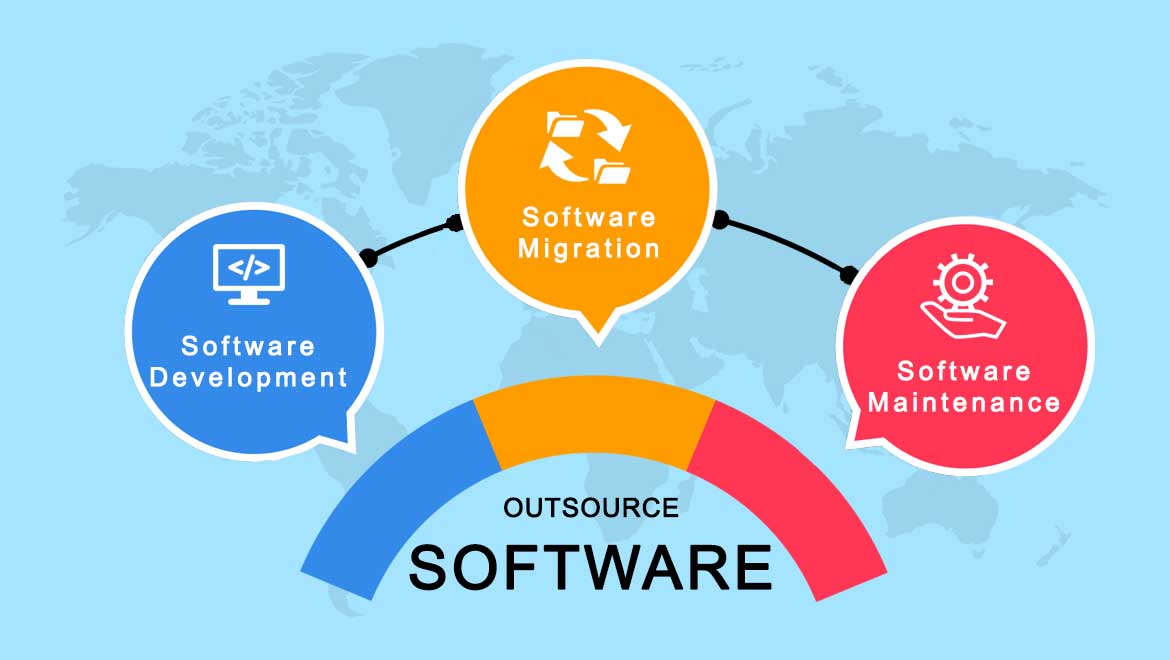Outsource software development services encompass a strategic approach to enhancing project efficiency and productivity. By delegating tasks to external experts, companies can streamline their operations and achieve optimal results. In this comprehensive exploration of outsourcing software development, we delve into the key aspects that make it a game-changer in the industry.
Exploring the definition, benefits, considerations, and best practices associated with outsourcing software development, this guide aims to provide valuable insights for businesses looking to optimize their project management processes.
Definition of Outsource Software Development Services

Outsource software development services refer to the practice of hiring external companies or freelancers to handle the design, development, testing, and maintenance of software applications. This approach allows businesses to focus on their core activities while leveraging the expertise of external professionals in the field of software development.
Tasks Typically Outsourced in Software Development
- Software design and architecture
- Coding and programming
- Quality assurance and testing
- Software maintenance and support
- Integration of third-party tools and technologies
Reasons Companies Opt to Outsource Software Development Services
- Cost savings: Outsourcing can be more cost-effective than hiring an in-house team, as companies can avoid expenses related to recruitment, training, and infrastructure.
- Access to specialized skills: Outsourcing allows businesses to work with professionals who have specific expertise in software development, ensuring high-quality results.
- Increased flexibility: Companies can scale their development team up or down based on project requirements, without the constraints of a fixed in-house team.
- Focus on core activities: By outsourcing software development services, companies can focus on their primary business goals and strategies, leaving the technical aspects to external experts.
Benefits of Outsourcing Software Development
Outsourcing software development services offer numerous advantages for businesses looking to streamline their operations and improve efficiency. By partnering with external experts, companies can benefit from specialized skills, cost savings, and increased scalability.
Cost Savings
Outsourcing software development can lead to significant cost savings compared to in-house development. Companies can avoid the expenses associated with hiring and training new staff, purchasing equipment, and maintaining infrastructure. Outsourcing also allows businesses to benefit from competitive pricing offered by offshore development teams in countries with lower labor costs.
Specialized Skills
One of the key advantages of outsourcing software development is gaining access to a diverse talent pool with specialized skills. External teams often have expertise in specific technologies or industry domains, allowing businesses to leverage their knowledge and experience for better project outcomes. This can result in faster development cycles, higher quality products, and innovative solutions to complex problems.
Improved Scalability
Outsourcing software development enables companies to scale their projects more effectively based on changing requirements and business needs. External teams can quickly ramp up or down resources as needed, allowing businesses to adapt to market demands and project timelines. This flexibility and agility are crucial for staying competitive in today’s fast-paced business environment.
Considerations Before Outsourcing Software Development

When considering outsourcing software development, there are several key factors to take into account to ensure a successful partnership and project delivery. It is crucial to choose the right outsourcing partner and evaluate their quality and reliability before making a decision.
Identifying Key Factors
- Define your project requirements clearly to ensure the outsourcing partner understands your needs.
- Evaluate the outsourcing vendor’s expertise, experience, and technical capabilities in software development.
- Consider the cultural fit and communication channels to ensure smooth collaboration throughout the project.
- Assess the outsourcing vendor’s reputation, past projects, and client testimonials to gauge their reliability.
Choosing the Right Outsourcing Partner, Outsource software development services
- Look for a partner with a proven track record in delivering high-quality software solutions within deadlines.
- Consider the scalability and flexibility of the outsourcing vendor to accommodate your project’s changing requirements.
- Verify the outsourcing partner’s compliance with security standards and data protection regulations to safeguard your sensitive information.
Evaluating Quality and Reliability
- Request for samples of the outsourcing vendor’s work to evaluate the quality of their code and software applications.
- Conduct thorough interviews and discussions with the vendor’s team to assess their communication skills and project management approach.
- Check for certifications, industry affiliations, and awards that validate the outsourcing partner’s expertise and commitment to quality.
Best Practices for Managing Outsourced Software Development Projects

Effective management of outsourced software development projects requires careful planning and execution to ensure successful outcomes. Here are some best practices to consider:
Design a Workflow for Effective Communication
- Establish clear channels of communication with the outsourced team, including regular meetings, progress updates, and feedback sessions.
- Utilize project management tools such as Slack, Trello, or Jira to facilitate real-time communication and collaboration.
- Define roles and responsibilities within the team to avoid confusion and streamline decision-making processes.
- Encourage open and transparent communication to address any issues or concerns promptly.
Organize Strategies for Ensuring Project Deadlines Are Met
- Set realistic and achievable deadlines based on the scope of work and resources available.
- Monitor progress regularly and identify potential bottlenecks or delays early on to take corrective action.
- Implement agile methodologies like Scrum or Kanban to adapt to changing requirements and prioritize tasks effectively.
- Establish a milestone-based approach to track progress and ensure alignment with the project timeline.
Create a Plan for Handling Cultural Differences
- Understand and respect cultural nuances and differences within the outsourced team to foster a harmonious working relationship.
- Provide cultural sensitivity training to team members to promote mutual understanding and collaboration.
- Adapt communication styles and approaches to accommodate cultural preferences and avoid misunderstandings.
- Celebrate diversity and leverage cultural diversity as a strength to drive innovation and creativity within the team.
Summary: Outsource Software Development Services
In conclusion, embracing outsourced software development services can lead to unprecedented growth and success for organizations seeking to stay ahead in a competitive landscape. By leveraging the expertise of external partners and adhering to best practices, companies can achieve remarkable results and drive innovation in their projects.
FAQ Corner
What types of tasks are commonly outsourced in software development?
Tasks such as coding, testing, maintenance, and support are often outsourced to specialized teams or individuals to streamline the development process.
How can companies ensure the quality of outsourced software development services?
Companies can maintain quality standards by thoroughly vetting potential outsourcing partners, conducting regular performance reviews, and establishing clear communication channels.
What are the key advantages of outsourcing software development?
Outsourcing software development can lead to cost savings, access to specialized expertise, faster project delivery, and enhanced scalability for businesses.
